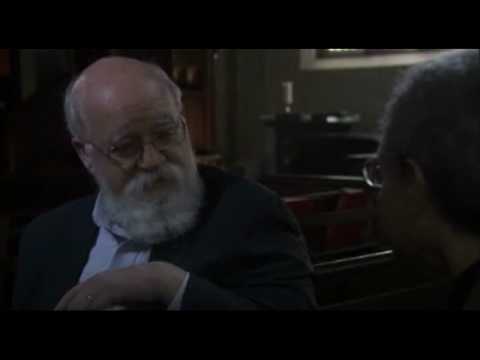LennyBound
Daniel Dennett is a prominent American philosopher whose research centers on philosophy of mind and philosophy of science; particularly as those fields relate to evolutionary biology and cognitive science. He is currently the co-director of the Center for Cognitive Studies and the Austin B. Fletcher Professor of Philosophy at Tufts University.
http://en.wikipedia.org/wiki/Binding_problem
In this clip, Dennett discusses what is known as “The Binding Problem.” Namely, how is the unity of conscious perception brought about by the distributed activities of the central nervous system? Dennett argues that while it may intuitively seem like consciousness is a unitary phenomena, cognitive science has illustrated that one’s experience is much less unified then first believed. As a result, Dennett concludes that one’s sense of unity is simply an illusion.
Source



@petestrat07 " If its not fact then its a dogmatic response to explain the unknown which is similar to the dogma of religion." Come on man, even you must realise this is inherently dishonest, Your saying the science of philosiphy has nothing to say about consciousness? not only that but you sort of implied that the only philosiphy is religous philosiphy. Going beyond philosiphy we have many scientific fields that study conciousness, like say, neuro science?
Come on bro, use your brain
@GermanOperaSinger Check out V.S. Ramachandran, amazing neuro scientist, also we know that to experience anything in the sense you speak of we need minds, the only minds that we have ever seen are the results of brains – we see animals with brains that dont have the same "Experience" as us and thats due to the development of the brain – we know that a more complex and developed brain can give range to greater experience, also maybe try Betrand Russel or Sam Harris
he is just stupid as a philosopher. i will think he is decent enough man if he admits his ignorance.
Dennett takes the simple view. Occam's razor – the simple answers usually turn out to be the correct ones. He also has a wealth of data from brain trauma and mental illnesses as well a data from psychological trials. He's honest about the fact that he's presenting ideas – all are ignorant if you're talking empirical data because the brain is unique among biological tissues in the fact that dead tissue tells you almost nothing about its function.
Another problem is that people *are* their consciousness. Consciousness is the ability to know you exist and that's all it is. People don't want it to be this. Some people want it to be an immortal soul to give their consciousness a sort of ejector seat for when their brain dies. Others want it to be a little observer watching a Cartesian Theatre presented by inputs from the senses. 'I'm more than this I know I am,' they shout … 'I'm special!' You are, but not in that way. Try some humility.
Although Dennett tried and failed to explain consciousness, he's a fat jolly Santa and I could see him enjoying a massive turkey dinner this Christmas!
It's not a matter of my opinion, pretty much most neuroscientists studying consciousness have rejected some or all of dennett's arguments.
Dennett's a philosopher first, as is a lot of the academic approach to consciousness right now. So his philosophical arguments fall flat because quite frankly he cannot explain qualia. I've read multiple drafts model and found it woefully inadequate. With regards to scientists, VS Ramachandran is a neutral monist and Christof Koch thinks consciousness is a fundamental property in the universe. They are the two of the leading scientists in the field. Dennett's a physicalist monist.
One can't objectify a subjective experience. Dan's correct in that the material experience is limited by our senses. What is enjoyment and suffering, then, is how the 'witness' accepts the interaction; what may be an enjoyable song to one may be unpleasant to another. Our misidentification with our senses is illusive in the sense that owing to our misidentification with matter, we enjoy and suffer when identifying with some arrangement of matter and its experience.
-SwamiTripurari moderator
The 'what it's like' of experience is misleading. What you mean is that you think, recall, and talk about certain things which you call experiences. There is no 'what it's like' prior to, or standing behind this activity. You perceive red, but the 'what it's like' is not reducible to or contained in this perception.
I've learned some things from Dan over the years, but I don't think he has a theory of consciousness.
They're at church? I never thought Dan Dennett would be caught in one of those. lol.
hahaha, if the mind is being fooled, what exactly is being fooled if not consciousness.
He is 100% correct that there is no biological substrate for the complete qualia experience, thats why quantum mind theory and non locality is pointing the way.
His problem is Penrose and the impossibility of raising consciousness with classical physics running in a computer made from flesh.
Those guys were flying high until Penrose brought them crashing back to earth.
(1) *Shrugs* If it doesn't work with physics, it doesn't work. If it works, there's a way of deconstructing it. It's like Dennet says – it looks like magic until you see how it's done, then you say, 'is that all?' Producing a rabbit from and empty hat is amazing!
(2) Showing a hat to be empty, then taking a rabbit bound up in a spring loaded draw-string bag from a pouch stapled to the underside of your table and slipping it into your hat as you bow, than releasing the drawstring so that the spring flips out and the bag becomes the lining of the hat, is not miraculous.
"it looks like magic until you see how it's done, "
Its proven to be impossible the way it appears, brain cannot produce consciousness by running algorithms based on classical physics, dennet is fooling himself.
His own argument destroys his postulation.
He claims its illusion, that implies "something" is being fooled, what is being fooled ? and you're back to awareness again.
I can't believe he falls for his own BS.
All Dennet is doing is moving the goalposts.
He hasn't solved the hard problem.
" saying the science of philosiphy has nothing to say about consciousness?"
Is there such a thing as science of philosophy, I know about philosophy of science but not the other way round.
Like most things that deal with or are related to Philosiphy it depends who you ask. Some say that Philosiphy IS a science, some say that science is merely natural philosiphy which was the old name for science. beyond that you can talk about the philosiphy Of science just like the Philosiphy of Math.
I forget what my original comment was responding to and I don't really think whether philosiphy is a science was important to it and I don't have a dog in that fight
It seems that Dennett is saying that consciousness emerges as a kind of lag effect of the brain creating coherence out of many streams of data. Still, that may explain the true nature of our sensory perceptions, but I fail to see how it addresses awareness and/or consciousness itself.
Dennett is just incoherent – a babbling old man pretending to be a grand philosopher.- blah.
1. We feel that we have a unified experience.
2. Brain activity is not unified.
The most logical conclusion from here is not that our experience is an illusion. The simplest and most logical conclusion is that consciousness is not reducible to brain activity at all. Daniel Dennett clings to his obsolete philosophy against all reason. There is simply no reason to believe that consciousness is a function of the brain.
I recommend reading "Consciousness Explained." For the most part the book is a fascinating congruence between philosophy and science. However, anyone reading it with a critical mind will notice that near the end of the book Dennet does a bait and switch. He spends the entire book explaining neurology, gestalt psychology and sensory illusion, relating it to his multiple drafts model, and all of a sudden this idea of illusion cohesive illusion regarding neural binding just pops out of nowhere. It is a "just so" story. It explains nothing.
Just what is it Mr. Dennet that is having the illusion in the first place?
Consciousness is an illusion for the brain??? That makes no sense. I think it's time Dennett's brain got rid of that illusory idiot called Daniel Dennett.
This is ridiculous. When I see a table I don’t see the color and the physical shape differently. Cognitive science has not shown that ones experience is not unified it has just it is an illusion. This is the problem with materialist scientists. Anything they cannot explain is an illusion.
Dennet is coming himself.
He jumps tracks from "consciousness is an aggregate of activitiy in the brain" to "consciousness is an illusion"